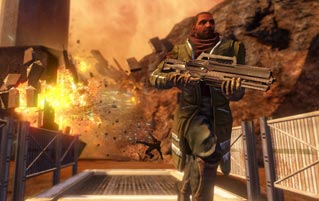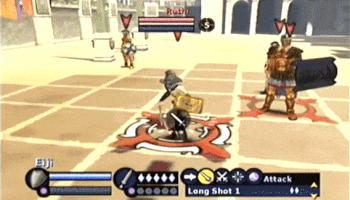5 Lost Video Game Features That Should've Become Standard

We spend enough time complaining about how games/movies/etc. are endless copies and ripoffs that it's probably worth it to notice when the opposite happens. There are a few things that are cool and original and should have been copied, but weren't. Think of how many games would be improved by ...
Red Faction: Guerrilla's Ability To Destroy Every Building
Like all remotely playable old Xbox games, Red Faction: Guerrilla was recently re-released and re-Mars-tered. (See, because it takes place on Mars. Their joke, not mine.) For those who don't remember, Red Faction: Guerrilla is the explodiest game ever made.

Every single in-game structure is fully destructible. Of course, when things aren't actively on fire, there's basically nothing to look at, as the enemy AI is moronic and the shooting sections are less exciting than running through your local grocery store making pew-pew sounds at the elderly. We didn't need a remaster of this game; we needed other games to steal what was special about it.
Sure, games like Mercenaries and a handful of Battlefields tout their powerful "destruction engines," but no game ever replicated Red Faction's "Geo-mod" system's attention to detail. In Mercenaries, dropping enough bombs on a building eventually sparks a pre-scripted "Oh, I'm totally exploding now" animation wherein plumes of smoke obscure the game swapping out the "free-standing building" graphic for the "burned-out husk of a Wendy's" graphic. It's nothing more than a glorified cutscene.
But in Red Faction, buildings are actually destroyed brick by beautiful brick, in a way that makes sense.

Players are provided an assortment of weapons -- including a big-ass hammer -- and tasked with flattening every government building on Mars. The hook is that buildings collapse when they're structurally unsound, not just when their health points are fully depleted. Smashing out a load-bearing wall causes the public library to realistically crumble under the strain, and it'll take out any other nearby buildings it hits on the way down, like the world's sexiest, most dangerous game of dominoes.
That was nine years and an entire console generation ago, and I'm still waiting for something similar. Hell, even the sequel, Red Faction: Armageddon, forgot what made the first game great by inexplicably removing the wide-open setting and unlimited destruction and moving the action underground, where you mostly just smash pipes. Unsurprisingly, that decision killed the series, the publisher, my zest for lovemaking, and apparently the citizenry's collective ability to feel joy.
Not all gamers are created equal. Some players can snipe a grunt from a thousand yards while masturbating with their free hand, while others are lucky if they don't accidentally plasma grenade their entire platoon. That's why virtually every game in existence has multiple difficulty settings, usually ranging from "Easy" to "Fuck You, Dad, I'm Too Busy For The Family Reunion." That said, it's not exactly customizable -- you're usually just upping the number of bullets each enemy can absorb.
System Shock, on the other hand, allowed players to choose the difficulty level of individual sections. On a scale of 0-3, you determine the difficulty of combat, missions, puzzles, and cyber tasks. In other words, if you love challenging combat but don't want to deal with stupid puzzles or hacking segments, it's easy to set System Shock so it matches your entitled millennial needs. Oh, and this was in freaking 1994.

Now try to remember every game you've played that abruptly switched from frantic fun to mindless tedium as you transitioned from combat to stealth, or from stealth to puzzle-solving, or from exploration to some convoluted "negotiation" mechanic with the villagers. If you turn down the difficulty to make the annoying parts a breeze, suddenly combat is boring too, with enemies seemingly dying of heart attacks induced by the mere sound of gunfire.
Now imagine you can customize each part of it. You'd get an Arkham game in which you can make stealth as tense as possible, but the minute you have to use one of Batman's dumbass electro freeze graplink hookarangs in combat, the game politely pulls back. Or vice-versa. Hey, if you let us smooth out the individual annoying parts, maybe players will actually finish the games they buy.
Gladius was a turn-based tactical game from the PS2 era, so it's in a genre that automatically turns off a huge percentage of the less patient gamers out there -- those weirdos who don't like pausing a life-and-death battle in between every blow to consider the next move over a relaxing cup of tea. But just as big of a turnoff for most players is the element of chance. In most turn-based games, you select a move and pray fervently to whatever demigod is in charge of critical hit percentage that Bulbasaur's attack will land successfully. The X-COM series even displays your odds, and provides many opportunities to put a fist-shaped hole in your monitor when your 95 percent chance shot from your sniper whiffs from spitting distance.
In Gladius, that dice roll is put into the player's hands.

When performing a regular attack, a meter pops up that's almost identical to a Tiger Woods' swing meter, or even Madden's "kicking meter." There's a brief countdown, then a cursor slides across. Depending on when the player presses the button, the attack is either normal, critical, or misses entirely. These meters become more difficult as the game progresses and you unlock complicated combo attacks or accidentally douse your fingers in nacho cheese. It's a simple change, but one that adds player agency to battles that'd otherwise be entirely up to cruel fate.
Imagine this system in X-COM. Instead of watching helplessly as your highly trained super soldiers routinely fail to hit that naked, defenseless alien squatting four feet away, you can feel like the outcome was actually up to you. It'd be nice if just for once, your squad's heart-wrenching death was entirely your fault instead of some invisible roulette wheel's.
Psi -Ops: The Mindgate Conspiracy's Psi-Surfing
If a shirtless Alex Jones lurched into your living room and violently puked up three cans of alphabet soup, it'd probably spell out something similar to Psi-Ops: The Mindgate Conspiracy. And honestly, that projectile vomiting would probably be more enticing than the actual game, as it's a pretty typical "The main character has these, these powers ... AND A GUN" game that is the industry's bread and butter. Oh, and it lets you transform nearly every inanimate object into a surfboard.
Yeah, what separates Psi-Ops from other superhero games with telekinesis-type powers is the ability to climb on top of the objects prior to chucking them at some dude's head, surfing almost any object like Bodhi catching that one final wave. Except your board is a barrel of gasoline, and the wave is 15 remarkably flammable security guards.

Even more shockingly, the mechanics are practically effortless. After a couple of tries, flying around on a table and chain-gunning bad guys into paste is as intuitive as landing a basic grind in Tony Hawk. And this isn't some glitch gamers figured out how to exploit; the majority of the game's puzzles require mind-surfing to solve.
Why haven't Star Wars games stolen this idea? Think how badass Force Unleashed or Jedi Knight would be with midair lightsaber battles between Sith surfing on bacta containers or dead stormtroopers. A one-dimensional slog through ground forces becomes a multi-leveled war zone where enemies and players strike from any angle. Tell me that's not more exciting than clumsily slashing your way through foot soldiers in Battlefront II, hoping to eventually get that power-up and play as Boba Fett for six seconds.
Forget games for a second, what about the Star Wars movies? If Episode IX doesn't feature Rey riding a floating C-3P0 into battle, THEN I'll help pony up $200 million for a fan remake.
Godfather II's Ability To Actually Run A Criminal Empire
One of my biggest gripes with modern games is the same gripe I have with my personal life: Nobody lets me build a sprawling criminal empire. A couple of Grand Theft Auto games and Scarface: The World Is Yours flirt with crime simulator elements, but actually acquiring new drug fronts never feels right. "Building your empire" either means shooting everybody and declaring yourself head criminal or performing fetch quests until local shopkeepers agree to pay you. Something about picking up a dude's mail doesn't exactly scream "breaking bad."
The only game that ever came close for me is the much-maligned Godfather II. Now don't get me wrong, most of the time it's less fun than playing Donkey Kong Jungle Beat with Don Corleone's flappy jowls, but the extorting businesses and running rackets elements are fantastic.
Taking over a business requires "selling" an owner on how much they need your protection. Specifically, protection from you smacking the shit out of them. When intimidating an owner, a gauge comes up showing just how close they are to giving in. The more you threaten, the more money you'll earn, and each owner has a special weakness that unlocks more cash. Maybe they can't take a punch, or maybe they don't want you smashing their product, or maybe they just want somebody to talk to about the stresses of shoe-making. Find out what makes them piss their pants, and you're rolling in it. Money, that is, not piss.
But if you push it too far, they'll get desperate, whip out a shotgun, and try to paint their office with your brains. If you kill them, you can't take over the businesses because there's nobody to run it, and it's not like you're going to learn how to sell shoes. As your empire grows, you can hire foot soldiers to fend off attacks from rival gangs and go on other missions. By the end of the game, you truly feel like the crime king of Miami.
Seriously, why isn't this more integrated into other crime games? The Mafia games are primarily story-driven, and Grand Theft Auto has too many other things going on. And sure, Godfather II itself is almost unplayable (especially after so many years), but that shouldn't stop the industry from taking the parts that worked. Get better at stealing, guys.
Jordan Breeding also writes for a whole mess of other people, the Twitter, and a weird amount of gas station bathrooms.
Support your favorite Cracked writers with a visit to our Contribution Page. Please and thank you.
For more, check out 10 Video Games That Should Be Considered Modern Art and Xbox's Latest Controller Is A Real Game-Changer.
Follow us on Facebook. Game on.